The Intel 9th Gen Review: Core i9-9900K, Core i7-9700K and Core i5-9600K Tested
by Ian Cutress on October 19, 2018 9:00 AM EST- Posted in
- CPUs
- Intel
- Coffee Lake
- 14++
- Core 9th Gen
- Core-S
- i9-9900K
- i7-9700K
- i5-9600K
CPU Performance: Office Tests
The Office test suite is designed to focus around more industry standard tests that focus on office workflows, system meetings, some synthetics, but we also bundle compiler performance in with this section. For users that have to evaluate hardware in general, these are usually the benchmarks that most consider.
All of our benchmark results can also be found in our benchmark engine, Bench.
PCMark 10: Industry Standard System Profiler
Futuremark, now known as UL, has developed benchmarks that have become industry standards for around two decades. The latest complete system test suite is PCMark 10, upgrading over PCMark 8 with updated tests and more OpenCL invested into use cases such as video streaming.
PCMark splits its scores into about 14 different areas, including application startup, web, spreadsheets, photo editing, rendering, video conferencing, and physics. We post all of these numbers in our benchmark database, Bench, however the key metric for the review is the overall score.
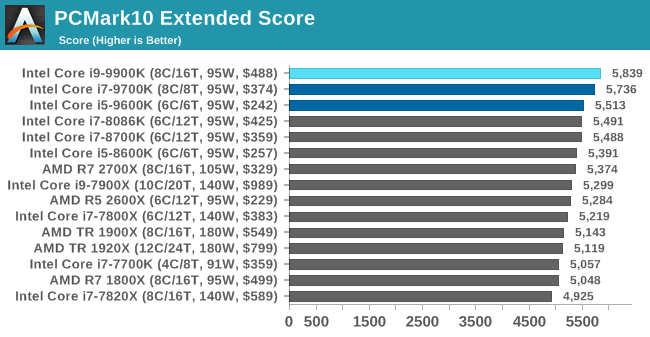
As a general mix of a lot of tests, the new processors from Intel take the top three spots, in order. Even the i5-9600K goes ahead of the i7-8086K.
Chromium Compile: Windows VC++ Compile of Chrome 56
A large number of AnandTech readers are software engineers, looking at how the hardware they use performs. While compiling a Linux kernel is ‘standard’ for the reviewers who often compile, our test is a little more varied – we are using the windows instructions to compile Chrome, specifically a Chrome 56 build from March 2017, as that was when we built the test. Google quite handily gives instructions on how to compile with Windows, along with a 400k file download for the repo.
In our test, using Google’s instructions, we use the MSVC compiler and ninja developer tools to manage the compile. As you may expect, the benchmark is variably threaded, with a mix of DRAM requirements that benefit from faster caches. Data procured in our test is the time taken for the compile, which we convert into compiles per day.
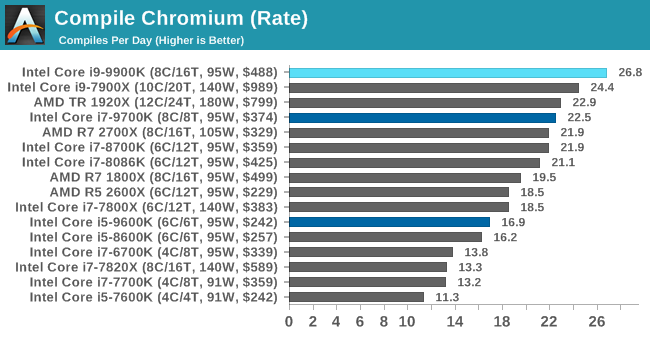
Pushing the raw frequency of the all-core turbo seems to work well in our compile test.
3DMark Physics: In-Game Physics Compute
Alongside PCMark is 3DMark, Futuremark’s (UL’s) gaming test suite. Each gaming tests consists of one or two GPU heavy scenes, along with a physics test that is indicative of when the test was written and the platform it is aimed at. The main overriding tests, in order of complexity, are Ice Storm, Cloud Gate, Sky Diver, Fire Strike, and Time Spy.
Some of the subtests offer variants, such as Ice Storm Unlimited, which is aimed at mobile platforms with an off-screen rendering, or Fire Strike Ultra which is aimed at high-end 4K systems with lots of the added features turned on. Time Spy also currently has an AVX-512 mode (which we may be using in the future).
For our tests, we report in Bench the results from every physics test, but for the sake of the review we keep it to the most demanding of each scene: Ice Storm Unlimited, Cloud Gate, Sky Diver, Fire Strike Ultra, and Time Spy.
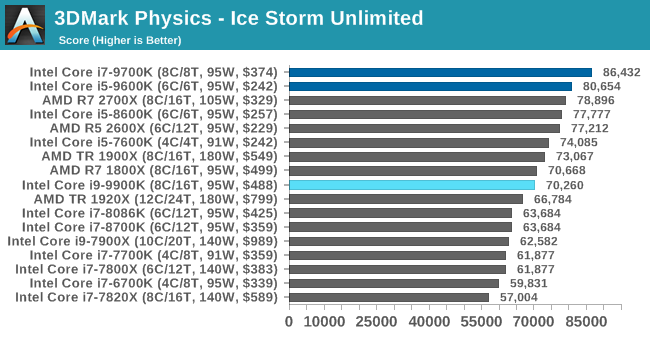
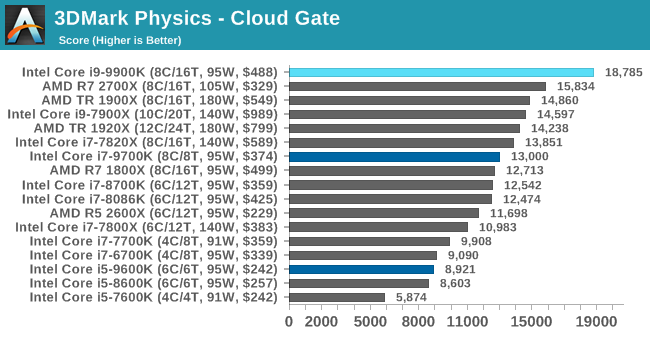
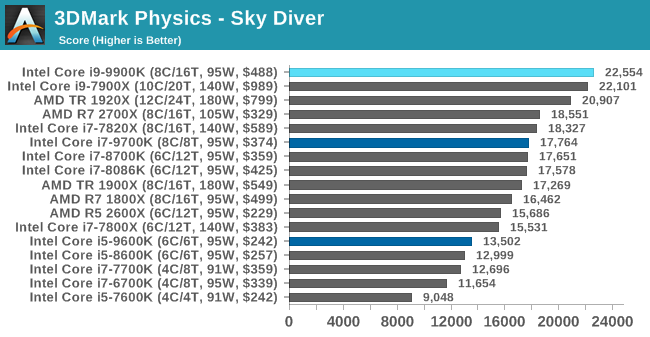
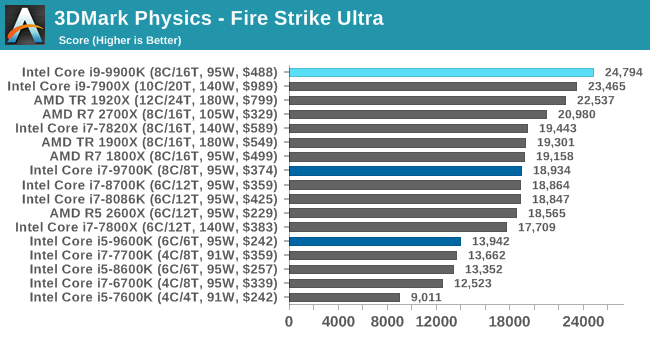
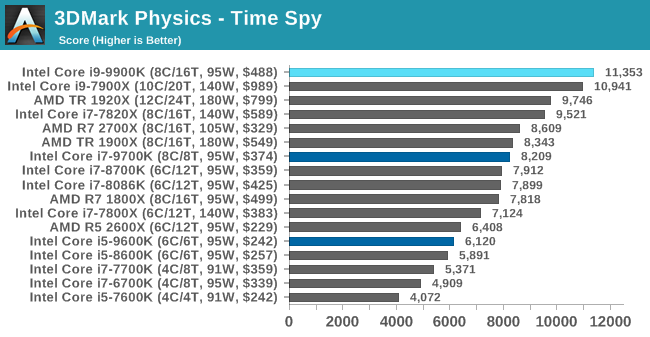
The older Ice Storm test didn't much like the Core i9-9900K, pushing it back behind the R7 1800X. For the more modern tests focused on PCs, the 9900K wins out. The lack of HT is hurting the other two parts.
GeekBench4: Synthetics
A common tool for cross-platform testing between mobile, PC, and Mac, GeekBench 4 is an ultimate exercise in synthetic testing across a range of algorithms looking for peak throughput. Tests include encryption, compression, fast Fourier transform, memory operations, n-body physics, matrix operations, histogram manipulation, and HTML parsing.
I’m including this test due to popular demand, although the results do come across as overly synthetic, and a lot of users often put a lot of weight behind the test due to the fact that it is compiled across different platforms (although with different compilers).
We record the main subtest scores (Crypto, Integer, Floating Point, Memory) in our benchmark database, but for the review we post the overall single and multi-threaded results.
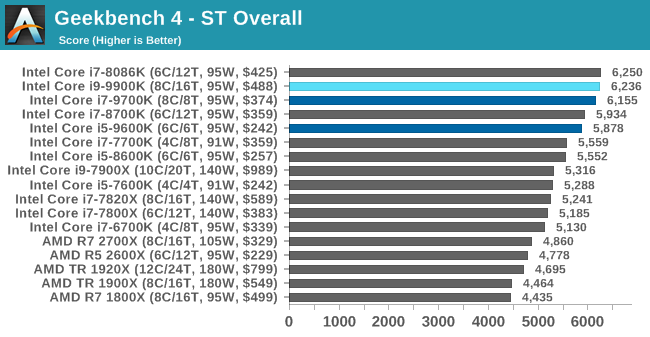
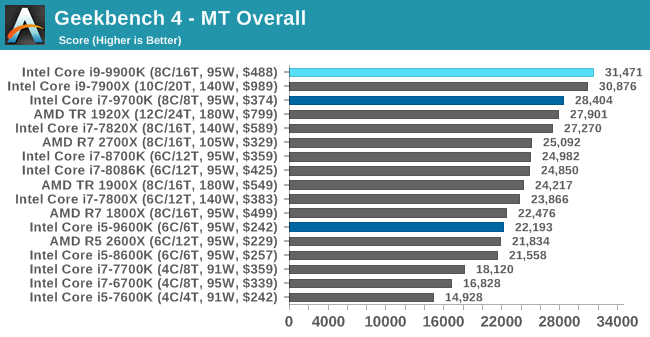










274 Comments
View All Comments
Ryan Smith - Friday, October 19, 2018 - link
For once, we're going to do the first comment!(What does everyone think of the article, and Intel's new CPU?)
DanNeely - Friday, October 19, 2018 - link
[thoughts]Ryan Smith - Friday, October 19, 2018 - link
Okay. That's well-played...nathanddrews - Friday, October 19, 2018 - link
My take on your data: worth it if you have something a lot faster than a GTX 1080 since it looks GPU-bound for most of the gaming benchmarks at med-high resolutions. 2080Ti users and SLI users will probably get the most out of it from a gaming perspective.Skylake-X with that AVX512 perf, though...
Ian Cutress - Friday, October 19, 2018 - link
One issue we always have every generation is sourcing GPUs. Going up to a vendor and asking for 3-4 cards is typically a no go. This is why I've done a range of resolutions/settings for each game, so cover everyone who wants to see CPU limited scenarios, and others that might be more real-world oriented.3dGfx - Friday, October 19, 2018 - link
Ian, how can you claim 9900k is the best when you never tested the HEDT parts in gaming? Making such claims really makes anandtech look bad because it sounds like a sales pitch and you omitted that entire HEDT platform from the results. I hope you fix this oversight so skyX can be compared properly to 9900K and the upcoming skyX refresh parts! And of course, AMD HEDT parts.There was supposed to be a part2 to the i9-7980XE review and it never happened, so gaming benchmarks were never done, and i9-7940X and i9-7920X weren't tested either. HEDT is a gaming platform since it has no ECC support and isn't marketed as a workstation platform.
IF intel says the 8-core part is now "the best" you ought to be testing their flagship HEDT parts which also were claimed to be the best.
3dGfx - Friday, October 19, 2018 - link
p.s. It would be nice if you can also do Zbrush benchmarking for all the cpu reviews. it runs entirely on the CPU with no GPU accelerations and it comes with a benchmark test/score built into the app. Zbrush is a very common 3d app these days. Also its useful to mention in a review how many polygons or subdivision levels can be displayed in zbrush by the cpu before you see a slowdown. thanks.Ryan Smith - Friday, October 19, 2018 - link
"Ian, how can you claim 9900k is the best when you never tested the HEDT parts in gaming?"Beg your pardon? We have the 7900X, 7820X, and a couple of Threadrippers for good measure. Past that, the farther up the ladder you go in Intel HEDT, the lower the turbo clockspeeds go, which diminishes gaming performance.
3dGfx - Friday, October 19, 2018 - link
sorry, I was mainly just looking for the flagship products and they have no gaming benches at all, 2990WX, 2950X, and 7980XE, these top end "best" parts have no gaming benchmarks. I wanted to see how they compare to the 9900k or to the refreshed skylakeX which will come out. if for example someone wants to buy a chip that is good for both raytrace rendering and games (game developers, etc.) they will want to see all these benches.Makaveli - Friday, October 19, 2018 - link
Why would you buy a 2990WX, 2950X, and 7980XEto play games on?